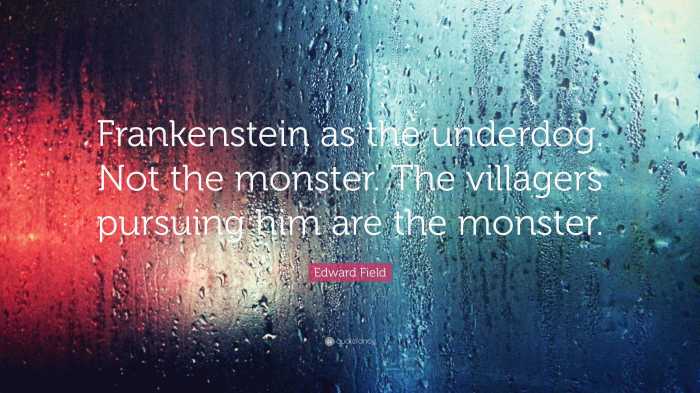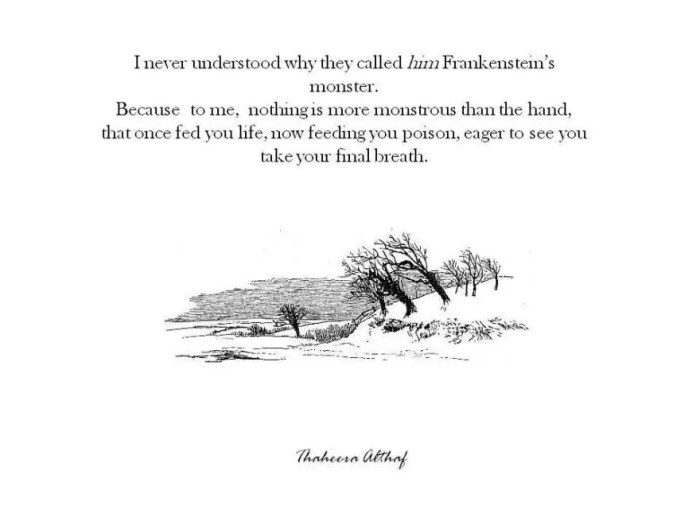Frankenstein poem by edward field – Edward Field’s “Frankenstein Poem” delves into the complexities of identity, morality, and the nature of the monstrous. Through its haunting imagery and introspective narrative, the poem explores the consequences of scientific hubris and the search for connection in a world that often rejects difference.
Field’s poem reimagines the classic Frankenstein story, examining the monster’s perspective and the ethical implications of its creation. It raises questions about the boundaries of humanity, the role of empathy, and the dangers of prejudice.
Frankenstein’s Monster

Frankenstein’s monster, also known as the Creature, is a fictional character who appears in Mary Shelley’s 1818 novel Frankenstein; or, The Modern Prometheus. The monster is created by Victor Frankenstein, a young scientist who assembles the monster’s body from parts of corpses. The monster is a grotesque and hideous creature, with a patchwork body and a distorted face.
He is also incredibly strong and intelligent, but he is also lonely and isolated. The monster’s physical and emotional characteristics are a reflection of his creator’s own hubris and lack of compassion.
Motivations and Actions
The monster’s motivations are complex and often contradictory. He desires companionship and love, but he is also capable of great violence. He seeks revenge against his creator, but he also longs for his acceptance. The monster’s actions are often driven by his own pain and suffering.
He is a tragic figure, who is both a victim and a perpetrator of violence.
Relationship with Victor Frankenstein
The monster’s relationship with Victor Frankenstein is complex and fraught with conflict. Frankenstein is both the monster’s creator and his tormentor. The monster desires Frankenstein’s love and acceptance, but Frankenstein is horrified by his creation. The monster’s relationship with Frankenstein is a reflection of the larger themes of the novel, such as the dangers of science and the importance of compassion.
The Creation of Frankenstein’s Monster
Victor Frankenstein creates the monster using a combination of scientific and alchemical techniques. He assembles the monster’s body from parts of corpses, and he uses electricity to bring the monster to life. Frankenstein’s creation of the monster is a violation of the natural order, and it has disastrous consequences.
Ethical Implications
The ethical implications of Frankenstein’s actions are complex. On the one hand, Frankenstein is a brilliant scientist who is pushing the boundaries of human knowledge. On the other hand, he is also a reckless and irresponsible creator who does not consider the consequences of his actions.
Frankenstein’s creation of the monster is a cautionary tale about the dangers of scientific hubris.
Role of Fate and Free Will
The role of fate and free will in the monster’s creation is also complex. Frankenstein’s actions are clearly driven by his own ambition and hubris. However, the monster’s own actions are also shaped by the circumstances of his creation. The monster is a victim of Frankenstein’s cruelty, but he is also a product of his own choices.
The monster’s story is a reminder that we are all responsible for our own actions, even if we are also victims of circumstance.
The Themes of Frankenstein

Frankenstein explores a wide range of themes, including the dangers of science, the importance of compassion, and the nature of good and evil.
Dangers of Science, Frankenstein poem by edward field
Frankenstein is a cautionary tale about the dangers of scientific hubris. Frankenstein’s creation of the monster is a violation of the natural order, and it has disastrous consequences. The novel suggests that science should be used for good, not for evil.
Importance of Compassion
Frankenstein also explores the importance of compassion. The monster is a tragic figure who is both a victim and a perpetrator of violence. He is a reminder that even the most monstrous of creatures deserve our compassion.
Nature of Good and Evil
Frankenstein also explores the nature of good and evil. The monster is not simply evil. He is a complex and contradictory figure who is capable of both good and evil. The novel suggests that good and evil are not always clear-cut, and that even the most evil of creatures can be capable of redemption.
The Style of Frankenstein
Frankenstein is written in a unique and distinctive style. The novel is characterized by its use of vivid imagery, its complex structure, and its use of language.
Use of Language
Frankenstein uses a rich and evocative language. Shelley uses a variety of literary devices, such as metaphors, similes, and personification, to create a vivid and immersive world for the reader.
Complex Structure
Frankenstein is a complex and multi-layered novel. The novel is told through a series of nested narratives, which creates a sense of suspense and mystery. The novel also uses a variety of flashbacks and foreshadowing, which helps to create a sense of depth and complexity.
Use of Imagery
Frankenstein is filled with vivid and haunting imagery. Shelley uses imagery to create a sense of atmosphere and to evoke a range of emotions in the reader. The novel’s imagery is often dark and disturbing, but it is also beautiful and poetic.
The Impact of Frankenstein

Frankenstein has had a profound impact on literature, film, and popular culture. The novel has been adapted into numerous films, television shows, and stage plays. The novel has also been the inspiration for a wide range of other works of art, including paintings, sculptures, and music.
Reasons for Popularity
Frankenstein is a popular novel because it explores timeless themes that are relevant to the human condition. The novel’s themes of the dangers of science, the importance of compassion, and the nature of good and evil are still relevant today.
The novel’s characters are also complex and relatable, which makes them appealing to readers of all ages.
Relevance to Contemporary Society
Frankenstein is still relevant to contemporary society. The novel’s themes of the dangers of science and the importance of compassion are particularly relevant in today’s world. The novel is a reminder that science should be used for good, not for evil, and that we should all strive to be more compassionate towards others.
FAQs: Frankenstein Poem By Edward Field
What is the main theme of Edward Field’s “Frankenstein Poem”?
The main theme of the poem is the exploration of identity, morality, and the nature of the monstrous, particularly through the perspective of Frankenstein’s monster.
How does Field portray the monster in his poem?
Field portrays the monster as a complex and sympathetic figure, highlighting its desire for connection and acceptance despite its monstrous appearance.
What is the significance of the poem’s title?
The title “Frankenstein Poem” suggests a re-examination of the classic Frankenstein story, focusing on the monster’s perspective and the ethical implications of its creation.